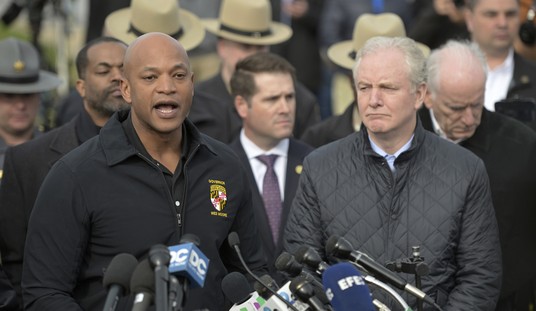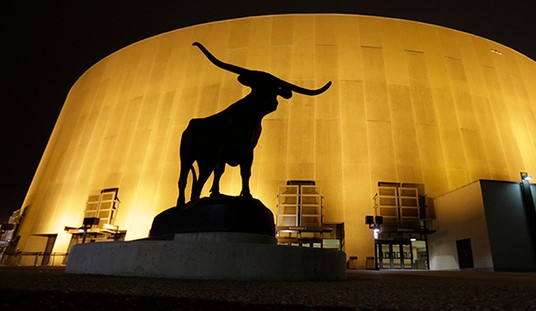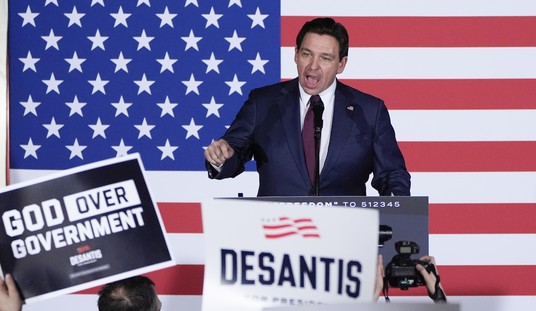Russia claims that security surrounding the Olympic Games in Sochi are a “ring of steel,” but at least for now it looks a little more like a grating. NBC reports that Russian security services are looking for three more women from the Caucasus who have threatened to conduct suicide-bombing attacks on the torch relay that will open the games, and NBC’s own analysts say that the ring of steel is mostly a myth:
Three more suspected “black widows” who Russian authorities believe were dispatched to carry out suicide bomb attacks on the Olympic torch relay were identified by NBC News on Tuesday.
According to wanted posters distributed by Russian police, Zaira Alieva, 26, Jhannet Tsakhaeva, 34, Oksana Aslanova, 26, are suspected to be preparing an attack from Tuesday and Thursday in the city of Rostov-on-Don, where the torch is due to arrive on Wednesday.
Officials allege that “organized underground groups” planned to use the three women as suicide bombers. Another poster named Ruzana Ibragimova, also known as Salima, as a suspected terrorist intent on targeting the Sochi Winter Olympics. …
On Sunday, a video surfaced in which two men from an Islamist militant group threatened to attack the Olympics, warning that “a surprise” is in store for President Vladimir Putin and tourists attending the Sochi Olympics.
CBS has more on the video, which has the US preparing for a possible evacuation in the event of an attack:
The IOC chose Sochi despite the fact that the nearby Caucasus has been in turmoil ever since the collapse of the Soviet Union. That’s not necessarily the fault of the Russian government, but it was their choice to propose Sochi as the location for the bid, too. With all of the threats mounting — and not just rhetorical threats, but pledges from active terrorist groups to target and hit the Olympics — CBS wonders just who will show up to watch:
What if they held an Olympics and nobody came?
The situation isn’t that bleak, of course, for the Sochi Games. Yet, with less than three weeks to go until the opening ceremony, hundreds of thousands of tickets remain unsold, raising the prospect of empty seats and a lack of atmosphere at Russia’s first Winter Olympics.
There are signs that many foreign fans are staying away, turned off by terrorist threats, expensive flights and hotels, long travel distances, a shortage of tourist attractions in the area, and the hassle of obtaining visas and spectator passes.
How have ticket sales gone? Not swimmingly:
Sochi organizers announced last week that 70 percent of tickets have been sold for the games, which run from Feb. 7-23 and represent a symbol of pride and prestige for Russia and President Vladimir Putin.
So what about the remaining 30 percent?
“We are keeping a special quota for those who come for the games, so that they can indeed buy tickets for the competitions,” organizing committee chief Dmitry Chernyshenko said.
Let’s not forget another reason why people aren’t flocking to Russia for the games … Vladimir Putin and his authoritarian regime. His crackdown on dissenters and gays have made headlines in the West, from where Olympics tourism would be most likely to flourish. Charles Lane asks why the IOC put up with Putin at all, and why the rest of us put up with the Olympics no matter where they are held:
I have just one question: How many more such embarrassments must we endure before ending this corrupt quadrennial exercise?
The modern Olympics were founded by a French aristocrat, Pierre de Coubertin, who believed in promoting international peace and understanding by reviving the ancient Greek custom of periodic truces for athletic competition.
Whatever might be said for that idea in theory, it hasn’t panned out in practice. The ostensibly apolitical Games have been marred by several boycotts — of Montreal in 1976 (by African nations protesting apartheid), of Moscow in 1980 (by the United States and other Western countries protesting the Soviet invasion of Afghanistan) and of Los Angeles in 1984 (by communist countries retaliating for 1980).
The Games also have created a target for extremists, from the Palestinian terrorists who killed 11 Israeli athletes at Munich in 1972 to ultra-rightest Eric Rudolph, who placed a deadly bomb at the 1996 Summer Games in Atlanta. Consequently, these celebrations of international conviviality proceed under heavy military guard.
Rather than curbing nationalism, the Olympics have arguably exacerbated it. The pursuit of gold-medal glory has led various countries to bribe judges or countenance rampant doping by athletes — and, in the case of the former East Germany, to subject many athletes to systematic steroid injections without their knowledge.
“The important thing at the Olympic Games is not to win but to take part; for the essential thing in life is not to conquer but to struggle well,” Coubertin said. Today’s Games make a mockery of that fine sentiment.
If the IOC doesn’t have enough sense and enough concern for athlete safety than landing the games near a terrorist/war zone in the middle of an authoritarian regime, then that’s not the only mockery that applies.
Update: Russia claims it killed one of the women in an attack on a terrorist hideout in Dagestan:
Report: Russia says it killed 7 terrorists in Dagestan, including rebel group leader Makhmud Aliev, 'black widow' Zaira Alieva – @cnnjill
— Breaking News (@BreakingNews) January 21, 2014
We’ll see if this holds up. By the way, our new Salem colleague John “Doc 0” Hayward has more at Human Events.








Join the conversation as a VIP Member